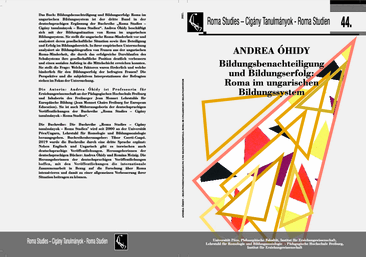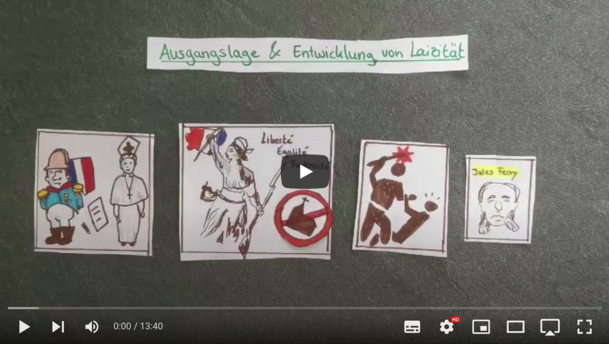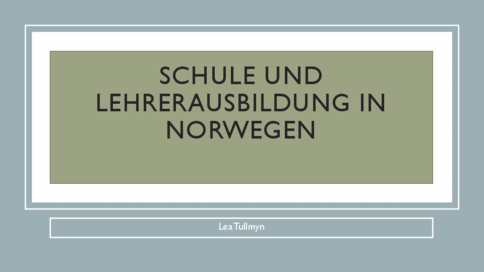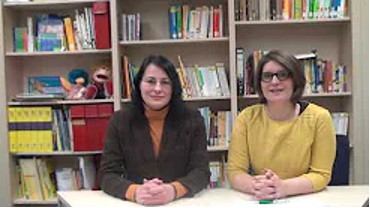
Publikationen
Pädagogischer Umgang mit bildungsbenachteiligten Lerngruppen (insbesondere aus der Europäischen Roma-Minderheit)
Buch: Bildungsbenachteiligung und Bildungserfolg: Roma im ungarischen Bildungssystem [Educational Attainment and Success: Roma in the Hungarian Education System](Andrea Óhidy)
Das Buch "Bildungsbeteiligung und Bildungserfolg" ist online verfügbar unter:
www.ph-freiburg.de/roma-studien
https://nevtud.btk.pte.hu/content/gypsy-studies
Direkt als PDF downloaden
Erinnern allein reicht nicht: Eine kritische Analyse möglicher Ansätze zur unterrichtlichen Antiziganismusprävention(Pia Greber)
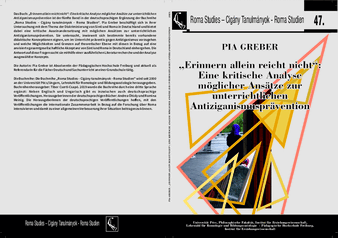
In ihrem Buch: „Erinnern allein reicht nicht: Eine kritische Analyse möglicher Ansätze zur unterrichtlichen Antiziganismusprävention" beschäftigt sich Pia Greber mit dem Thema der Diskriminierung von Sinti und Roma in Deutschland. Sie bietet dabei eine kritische Auseinandersetzung mit möglichen Ansätzen zur unterrichtlichen Antiziganismusprävention und untersucht, inwieweit sich bestimmte bereits vorhandene didaktische Konzeptionen eignen, um im Unterricht präventiv gegen Antiziganismus vorzugehen und welche Möglichkeiten und Grenzen auf theoretischer Ebene mit diesen in Bezug auf eine anvisierte gesamtgesellschaftliche Akzeptanz von Sinti und Roma in Deutschland einhergehen. Die Antwort auf diese Fragen sucht sie mithilfe einer ausführlichen Literaturrecherche und der Analyse ausgewählter Konzepte.
Video: https://youtu.be/iVkylH4RtxQ
Mentoring-Projekte für Roma-Kinder in Europa (Andrea Óhidy)
In ihrem Buch „Mentoring-Projekte für Roma-Kinder in Europa“ versammelt Herausgeberin Andrea Óhidy Beiträge über Mentoring-Projekte für Roma-Kinder aus ausgewählten europäischen Ländern, um das Thema sowohl aus deutscher als auch aus europäischer Perspektive zu betrachten. Diese Internationalität zeigt sich auch in der Mehrsprachigkeit des Bandes: Er beinhaltet sowohl deutsch- als auch englischsprachige Beiträge.
Video: https://youtu.be/dr85Bpj3rHw
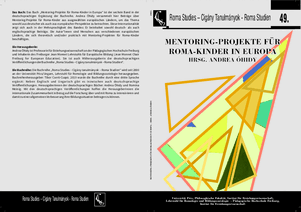
Europäisierung von Bildung und Erziehung
(Andrea Óhidy, Sheila Riddell and Alina Boutiuc-Kaiser)
The UN Convention on the Rights of the Child (UNCRC) recently had its 30th anniversary. Emerging from the United Nations General Assembly in 1989, it has since become the most ratified international human rights treaty ever. Most of the European countries ratified the UNCRC and are thus obliged to ensure the implementation of children’s rights in practice. Operationalizing the UNCRC raises practical, conceptual and ethical issues. For example, questions arise concerning children and young people’s capacity and competence to make autonomous decisions in different social domains, esp. in education. There are also debates about children’s involvement in dispute resolution and the extent to which rights must always be associated with redress in order to make them meaningful. Clearly, the relationship between the rights of children and young people on the one hand and those of parents on the other, are particularly salient. In addition, challenges may arise in relation to children from the Roma-minority, for example in educational institutions. Although Article § 28/1 of the UNCRC stresses that “State Parties recognize the right of the child to education, and with a view to achieving this right progressively and on the basis of equal opportunity”, Roma students usually suffer in educational institutions from multiple deprivation. There have been different rates of progress across Europe in terms of incorporating aspects of the UNCRC into domestic law and putting it into practice in schools and other education institutions.
Contributors draw on different disciplines and research traditions (Law, Psychology, Sociology, Social Policy and Education Sciences) in different European countries (Czech Republic,ireland, Scotland and Germany). Questions addressed by contributors include the following:
- What rights have been accorded to children and young people in different social policy arenas and European jurisdictions?
- What are and should be the roles of the state, parents and children?
- What challenges arise when translating policy rhetoric on Roma children’s rights into meaningful action on the ground?
- For the next 30 years, what dilemmas may arise in relation to Roma children’s rights? What are the potential solutions?
Articles:
Andrea Óhidy, Sheila Riddell & Alina Boutiuc-Kaiser: Children's rights in European education. Dilemmas, challenges and implementation regarding Roma children in selected European countries – An introduction
Markéta Levínská & Dana Bittnerová: Social Justice in Education from the
Perspective of the Roma in the Czech Republic - A Case Study
Sheila Riddel: The Rights of Children from Gypsy/Traveller and Roma Backgrounds in
Scotland
Cognard Gaëtan: The rainbow shamrock
Alina Boutiuc-Kaiser: 30 years of United Nations Convention on the Rights of
the Child in Germany
Interkulturelle Pädagogik
Multilingualism in Europe (Krisztina Sebestyén, Katarzyna Jagielska & Nadine Comes)
20 years ago, in 2002, prime ministers and head of states decided, that all people in the European Union should know two other, foreign languages beside of the mother language (Kommission der Europäischen Gemeinschaften 2005). Since that, the foreign language teaching and learning changed a lot, and the foreign language knowledge is one of the basic competences nowadays e. g. in education or labour market. But the foreign language knowledge of the European people is very different – that means level and languages as well. Furthermore, the good foreign language knowledge means not only the language knowledge (grammar, pronunciation, vocabulary etc.) but cultural information too. The cultural knowledge helps to interpret different situations on other foreign languages, and it takes better the foreign language knowledge. These are the start points of the thematic issue, in that there are theoretical and empirical papers about the foreign language teaching, learning and interesting about culture in foreign languages. Contributors to the thematic part of this special issue draw on different disciplines and research traditions among the following questions:
- How can we interpret constructivism in 21st century’s teaching / learning environment?
- How can we interpret and adapt in classrooms the theory of tertiary language didactics?
- How can we help interpretation of literary texts to develop students’ discourse competence?
- How can we realize the multilingualism in the Lithuanian educational institutions?
- How can we interpret the Reading and Mathematics competency results of students with learning disorder / integration, learning and behavioural difficulties in classes with special language curriculum?
- How can we recognize foreign students the Hungarian culture with help of museums?
Articles:
Sebestyén, Krisztina; Jagielska, Katarzyna & Comes, Nadine: Multilingualism in Europe among to some theoretical and empirical examples – Introduction to a thematic issue
Sarah Dietrich-Grappin & Britta Hufeisen: Tertiary language didactics 2.0 • A review of a multilingual didactics approach and its remodeling in the light of empirical research, translanguaging and compétence plurilingue
Tatiana Lașcu: Development of the discourse competence through literary texts
Jurgita Lenkauskaitė &Daiva Malinauskienė: Multilingualism in Lithuanian pre-school education institutions: Situation, issues, prospects
Roland Hegedüs & Krisztina Sebestyén: Focus on 10th grade students with learning problems: What influences their achievements?
Zum Video
Europäisierung von Bildung und Erziehung
Alina Boutiuc-Kaiser (2021): 30 years of United Nations Convention on the Rights of the Child in Germany
Andrea Óhidy, Sheila Riddell & Alina Boutiuc-Kaiser (2021): Children's rights in European education. Dilemmas, challenges and implementation regarding Roma children in selected European countries – An introduction
Interkulturelle Pädagogik
Alfred Holzbrecher & Patrick Blumschein (2023): Teaching and Learning in a Globalized Classroom - a Concept for University Didactics
Krisztina Sebestyén, Katarzyna Jagielska & Nadine Comes (2023): Multilingualism in Europe among to some theoretical and empirical examples – Introduction to a thematic issue
Jurgita Lenkauskaitė & Daiva Malinauskienė (2023): Multilingualism in Lithuanian pre-school education institutions: Situation, issues, prospects
Roland Hegedüs & Krisztina Sebestyén (2023): Focus on 10th grade students with learning problems: What influences their achievements?
Pädagogischer Umgang mit bildungsbenachteiligten Lerngruppen (insbesondere aus der Europäischen Roma-Minderheit)
Alina Boutiuc-Kaiser (2023): Navigating educational trajectories and transitions: A qualitative systematic literature review on international STEM doctoral students
Europäisierung von Bildung und Erziehung
Andrea Atzori (2023): Europabildung und Geschichtsdidaktik: gemeinsame Ziele im Vergleich (Hausarbeit)
Dorothée Dörffler (2023): Laizität - Erklärvideo (Video)
Lea Tullmyn (2023): Schule und Lehrerausbildung in Norwegen (PowerPoint)
Kristina Fix (2022): Hochbegabung in der Grundschule: Wie lässt sich ein hochbegabtes Kind erkennen und welche Förderungsmöglichkeiten gibt es? (Bachelorarbeit)
Der Podcast über die studentischen Präsentationen des Seminars “Europa“ als Unterrichtsthema mit Musik“ (Sommersemester 2023) (Podcast)
Der Podcast über die studentischen Präsentationen des Seminars “Europa“ als Unterrichtsthema mit Musik“ (Sommersemester 2021) (Podcast)
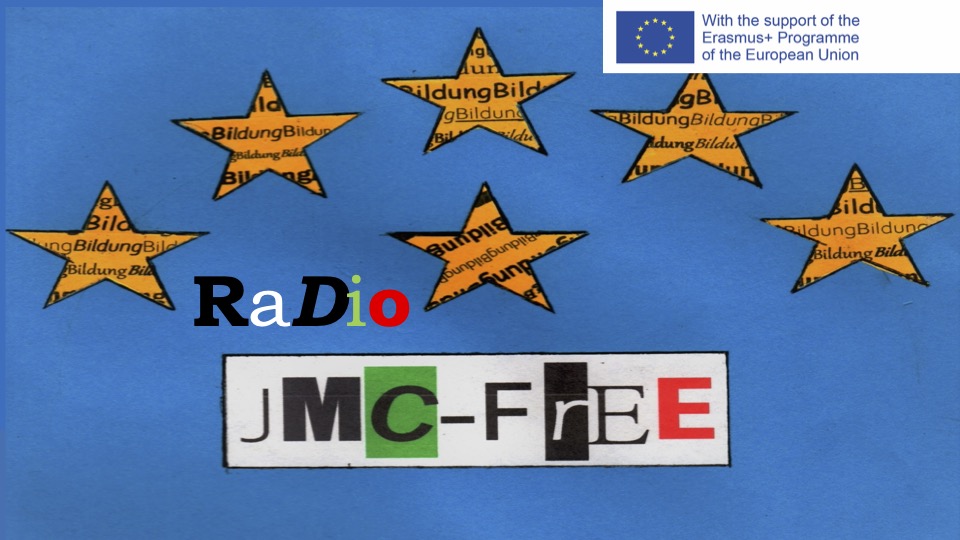
Camilla Illy (2022): Deutschland und Estland im Vergleich - Das deutsche und das estnische Schulsystem (Hausarbeit)
Leonie Wenger (2021): Was wird von den Schulen und den Lehrkräften bezüglich des lebenslangen Lernens erwartet und sind diese Erwartungen in der Realität umsetzbar? (Bericht)
Interkulturelle Pädagogik
Lea Becker (2023): Interkulturelle Bildung in der EU und Deutschland und deren Umsetzung in der Primarstufe anhand des Themas Europa (Hausarbeit)
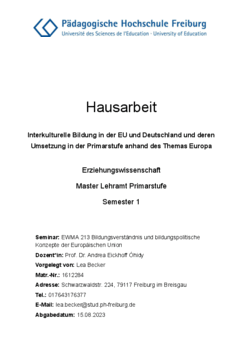
Marie-Luise Brudy (2023): Politische Bildung in der Primarstufe anhand der Kinderrechte (Hausarbeit)
Annina Maria Piazolo (2022): Unterrichtsmaterial über die Sinti und Roma Minderheit (Bachelorarbeit)
Laura Santangelo (2020): Lehramtsstudierende mit Migrationshintergrund. Zur Bedeutung des Migrationshintergrundes von Lehramtsstudierenden hinsichtlich ihres zukünftigen Lehrberufs (Masterarbeit)
Christof Stirner (2020): Wie kann Demokratie-Lernen im Jugendalter funktionieren? (Bericht)
Pädagogischer Umgang mit bildungsbenachteiligten Lerngruppen (insbesondere aus der Europäischen Roma-Minderheit)
Pia Greber (2023a): Erinnern allein reicht nicht: Eine kritische Analyse möglicher Ansätze zur unterrichtlichen Antiziganismusprävention, Bd. 5 Roma Studien
Pia Greber (2023b):Antiziganismusprävention im Unterricht in deutschen Schulen.In: Andrea Óhidy (Hrsg.) (2023): Mentoring-Projekte für Roma-Kinder in Europa. In: Bd. 6 Roma Studien, S. 125-197.
Annina Piazolo (2023): Sinti*zze und Rom*nja in deutschen Geschichtsbüchern. In: Andrea Óhidy (Hrsg.) (2023): Mentoring-Projekte für Roma-Kinder in Europa. In: Bd. 6 Roma Studien, S. 17-61.
Marie-Luise Loewe (2023): Rassismusprävention an Schulen. Der Beitrag des Netzwerks „Schule ohne Rassismus - Schule mit Courage“. In: Andrea Óhidy (Hrsg.) (2023): Mentoring-Projekte für Roma-Kinder in Europa. In: Bd. 6 Roma Studien, S. 65-125.
Sophie Landauer (2022): Grundschulkinder mit direkter Migrationserfahrung: Selbstkonzept und Mehrsprachigkeit (Masterarbeit)
Sarah Richter (2020): Die Stellung von Roma-Kindern im rumänischen Bildungssystem - Institutionelle, strukturelle und kulturelle Hürden (Bericht)
Weitere Publikationen des JMC-FrEE-Teams
Studien zur international vergleichenden Erziehungswissenschaft. Schwerpunkt: Europa/Studies in International Comparative Educational Science. Focus: Europe (Hrsg. Karin Amos, Zoltán Györgyi, Jürgen Helmchen, Hans-Georg Kotthoff, Tamás Kozma, Marianne Krüger-Potratz, Andrea Óhidy and Magdolna Rébay, Springer VS)
Roma Studien (Hrsg. Andrea Óhidy and Romina Meinig)
Video (in German): Roma Studien Freiburg
Europäisierung von Bildung und Erziehung
Tamás Kozma, Magdolna Rébay, Andrea Óhidy & Éva Szolár (2014) (ed.): The Bologna-Process in Central and Eastern Europe. In: Studies in International Comparative Educational Science. Focus: Europe. Springer VS: Wiesbaden.
Andrea Óhidy (2011): Der erziehungswissenschaftliche Lifelong Learning-Diskurs. Rezeption der europäischen Reformdiskussion in Deutschland und Ungarn. VS Verlag für Sozialwissenschaften: Wiesbaden.
Andrea Óhidy (2009): Lebenslanges Lernen und die europäische Bildungspolitik. Adaptation des Lifelong Learning-Konzepts der Europäischen Union in Deutschland und Ungarn. VS Verlag für Sozialwissenschaften: Wiesbaden.
Andrea Óhidy (2009): Élethosszig tartó tanulás az Európai Unióban. A koncepció adaptációja Németországban és Magyarországon – egy összehasonlító vizsgálat. Pannon University of Veszprém: Veszprém.
Andrea Óhidy (2008): Lifelong Learning. Interpretations of an Education Policy in Europe. VS Verlag für Sozialwissenschaften: Wiesbaden.
Interkulturelle Pädagogik
Holzbrecher, A. & Schmolling, J. (2023): Fotografie in der Kulturellen Kinder- und Jugendbildung. Beltz Juventa
Alfred Holzbrecher & Ulf Over (2015) (ed.): Handbuch Interkulturelle Schulentwicklung. Beltz: Weinheim und Basel.
Alfred Holzbrecher (2011) (ed.): Interkulturelle Schule. Eine Entwicklungsaufgabe. Wochenschau: Schwalbach.
Nadine Comes (2011): Interlanguage, dreidimensionale Fremdsprachenkompetenz und die produktive Negativität bildender Erfahrungen in Lehr-Lernprozessen. University of Berlin: Berlin (master thesis)
Alfred Holzbrecher (2004): Interkulturelle Pädagogik. Cornelsen Scriptor: Berlin.
Pädagogischer Umgang mit bildungsbenachteiligten Lerngruppen (insbesondere aus der Europäischen Roma-Minderheit)
Roland Hegedüs (2020: Kompetenciák - Hátrányok - Térségek. Avagy honnan s hogyan jutnak el a hátrányos helyzetüek a felsöoktatásba? Debereceni Egyetemi Kiadó: Debrecen.
Andrea Óhidy & Katalin R. Forray (2020) (ed.): Lifelong Learning and the Roma Minority in Western and Southern Europe. Emerald: Bingley.
Andrea Óhidy & Katalin R. Forray (2019) (ed.): Lifelong Learning and the Roma Minority in Central and Eastern Europe. Emerald: Bingley.
Natascha Hofmann (2019): Einblicke in Alltagsrealitäten geflüchteter Roma aus Südosteuropa. University of Pécs: Pécs-Freiburg.
Norbert M. Seel, Thomas Lehmann, Patrick Blumschein & Oleg A. Podolskiy (2017) (ed.): Instructional Design for Learning – Theoretical Foundations. Sense Publishers: Rotterdam.
Andrea Óhidy (2016): A halmozottan hátrányos helyzetből a diplomáig – Tíz roma és cigány nő sikertörténete a magyar oktatási rendszerben. University of Pécs: Pécs.
Patrick Blumschein (2014) (ed.): Lernaufgaben – didaktische Forschungsperspektiven. Klinkhardt: Bad Heilbrunn.
Andrea Óhidy (2012): Heterogenität und Lehrerhandeln im Spiegel erziehungswissenschaftlicher Fallstudien. Schneider Verlag Hohengehren: Battmannsweiler.
David H. Jonassen, Patrick Blumschein & Woei Hung (2009) (ed.): Model-Based Approaches to Learning. Using Systems Models and Simulations to Improve Understanding and Problem Solving in Complex Domains. Sense-Publishers: Rotterdam.
Patrick Blumschein (2004) Eine Metaanalyse zur Effektivität multimedialen Lernens am Beispiel der Anchored Instruction. University of Freiburg: Freiburg (PhD-thesis).
Europäisierung von Bildung und Erziehung
Interkulturelle Pädagogik
Multilingualism in Europe (Krisztina Sebestyén, Katarzyna Jagielska & Nadine Comes)
20 years ago, in 2002, prime ministers and head of states decided, that all people in the European Union should know two other, foreign languages beside of the mother language (Kommission der Europäischen Gemeinschaften 2005). Since that, the foreign language teaching and learning changed a lot, and the foreign language knowledge is one of the basic competences nowadays e. g. in education or labour market. But the foreign language knowledge of the European people is very different – that means level and languages as well. Furthermore, the good foreign language knowledge means not only the language knowledge (grammar, pronunciation, vocabulary etc.) but cultural information too. The cultural knowledge helps to interpret different situations on other foreign languages, and it takes better the foreign language knowledge. These are the start points of the thematic issue, in that there are theoretical and empirical papers about the foreign language teaching, learning and interesting about culture in foreign languages. Contributors to the thematic part of this special issue draw on different disciplines and research traditions among the following questions:
- How can we interpret constructivism in 21st century’s teaching / learning environment?
- How can we interpret and adapt in classrooms the theory of tertiary language didactics?
- How can we help interpretation of literary texts to develop students’ discourse competence?
- How can we realize the multilingualism in the Lithuanian educational institutions?
- How can we interpret the Reading and Mathematics competency results of students with learning disorder / integration, learning and behavioural difficulties in classes with special language curriculum?
- How can we recognize foreign students the Hungarian culture with help of museums?
Articles:
Sarah Dietrich-Grappin & Britta Hufeisen: Tertiary language didactics 2.0 • A review of a multilingual didactics approach and its remodeling in the light of empirical research, translanguaging and compétence plurilingue
Tatiana Lașcu: Development of the discourse competence through literary texts
Jurgita Lenkauskaitė &Daiva Malinauskienė: Multilingualism in Lithuanian pre-school education institutions: Situation, issues, prospects
Roland Hegedüs & Krisztina Sebestyén: Focus on 10th grade students with learning problems: What influences their achievements?
Zum Video
Pädagogischer Umgang mit bildungsbenachteiligten Lerngruppen (insbesondere aus der Europäischen Roma-Minderheit)
Andrea Óhidy, Nadine Comes & Norbert Pikula (2020) (ed.): Special issue about Mentoring programmes for disadvantaged children in selected European countries. In: Hungarian Educational Research Journal 3/2020.
Video
Andrea Óhidy & Katalin R. Forray (2019) (ed.): Special issue about The situation of Roma women in Europe: Increasing success in education In: Hungarian Educational Research Journal 1/2019.
Europäisierung von Bildung und Erziehung
Natascha Hofmann (2020): Für gesellschaftliche Teilhabe von Roma in Europa. Bemerkungen zu Menschenrechten, EU-Rahmenprogrammen und bildungspolitischen Ansätzen, in: Jenseits des Nationalen? Erziehung und Bildung im Spannungsverhältnis von Entgrenzung und Begrenzung nationaler Ordnungen. Leverkusen: Budrich Verlag, 69-87.
Andrea Óhidy (2013): A Lifelong Learning-paradigma a magyarországi oktatáspolitikában. In: Paksi, L./Györe, G./Tóth-Márhoffer, M./Bognárné Kocsis, J.: A pedagógia útjain. Pannon Egyetemi Kiadó: Veszprém, 161-173.
Andrea Óhidy (2011): Adaption des Lifelong Learning-Konzepts der Europäischen Union in der deutschen und ungarischen Bildungspolitik. In: Terium Comparationis 1/2011, S. 334-59.
Andrea Óhidy (2011): Az élethosszig tartó tanulás paradigmája a német és a magyar oktatáspolitikában. In: Új Pedagógiai Szemle 11-12/2011, 5-22.
Andrea Óhidy (2011): Az Európai Unió Lifelong Learning-koncepciójának adaptációja a magyar oktatáspolitikában. In: Agora 7/2011, S. 99-109.
Andrea Óhidy (2010): A Bologna-reform és a németországi pedagógusképzés. In: Pedagógusképzés 8/1 2010, 173-188.
Andrea Óhidy (2006): Lifelong Learning – az oktatáspolitikai koncepciótól a pedagógiai paradigmáig. In: Új Pedagógiai Szemle, 11/2006, S. 89-99.
Andrea Óhidy (2006): Az élethosszig tartó tanulás és a felnőttképzés. In: Új Pedagógiai Szemle, 10/2006, S. 114-125.
Andrea Óhidy (2006): Az élethosszig tartó tanulás és az iskola. In: Új Pedagógiai Szemle, 9/2006, 109-120.
Andrea Óhidy (2006): Lifelong Learning. Egy oktatáspolitikai koncepció értelmezési lehetőségei Európában. In: Új Pedagógiai Szemle, 6/2006, S. 65-71.
Interkulturelle Pädagogik
Holzbrecher, A.; (2023): Beiträge im Buch: Holzbrecher, A.; J. Schmolling (Hg.) (2023), Fotografie in der Kulturellen Kinder- und Jugendbildung, Weinheim und Basel (Beltz).
- - Herausforderungen für Kulturelle Bildung und Medienbildung (S.16-24);
- - Der Beitrag der Fotografie zur Kulturellen Bildung (S.26-30);
- - Pädagogische Schlüsselbegriffe: Subjektorientierung (S.90-94);
- - Diversität (S.108-111); Multimodales Lernen meets Kulturpädagogik (S.112-114);
- - Fotopädagogik zwischen Lehrgang und Drauflosknipsen (S.122-137);
- - ZwischenRäume gestalten. Fotografie und Interkulturelles Lernen (S.138-141);
- - Kinder- und Jugendfotos verstehen lernen (S.262-278)
Jobst, S./*Franz, A.* (2021): *The Field of Intercultural Education and Democracy. Intercultural Research in Critical and Democratic Perspektive.* In: Werler, T./Herheim, R./Hiis Hauge, K.: Lived Democracy. Routledge: 40-53.
Lenkauskaitė, Jurgita; Malinauskienė, Daiva. (2022) Multilingualism inLithuanian pre-school education institutions: situation, issues, prospects // Hungarian educational research journal (HERJ). Budapest: Akadémiai Kiadó. ISSN 2064-2199. 2022, first published online, p. [1-19]. DOI:10.1556/063.2022.00138.
Nadine Comes & Sarah Dietrich-Grappin (2019): Sprachensensible Portfolioarbeit in der Lehrerbildung. Der professionelle Umgang mit sprachlicher Heterogenität im Spiegel der eigenen Sprachenbiographie In: Mordellet-Roggenbuck, I./Raith, M. & Zaki, K. (ed.): Mehrsprachigkeit und ihre Didaktik. Modelle und Konzepte für die Lehrer*innenbildung. Berlin: Peter Lang.
Nadine Comes (2018): Negative Erfahrung im Zweitspracherwerb: Eine Studie zur Entwicklung der Interlanguage von Kindern einer deutsch-französischen Kindertagesstätte in Berlin. In: International Dialogues on Education. Past and Present. IDE-Online Journal. Volume 4/2/2017, 150-156.
Alfred Holzbrecher (2018): Interkulturelle Schulentwicklung. I: Barz, H. (ed.), Handbuch Bildungsreform und Reformpädagogik, Springer: VS Wiesbaden, 485-492.
Andrea Óhidy (2018): Interkulturelle Reformschulen: Interkulturelle Waldorfschule Mannheim, Quinoa-Schule Berlin. In: Barz, H. (ed.): Handbuch Reformpädagogik und Bildungsreform. Springer: VS Wiesbaden, 284-293.
Alfred Holzbrecher (2017): Interkulturelle Erfahrung als Kontaktprozess gestalten. In: Kahrs, Chr./ Seipolt, J. (ed.): Interkulturelle Begegnung ästhetisch reflektiert. Ein pädagogisches Studien- und Theaterprojekt im Heiligen Land, Reihe Interreligiöses Lernen an Hochschulen. LIT-Verlag: Berlin, 194-201.
Alfred Holzbrecher (2017): Interkulturelles Lernen, Globales Lernen, Diversity. In: Ahrenholz, B./Oomen-Welke, I (ed.): Deutsch als Zweitsprache. Schneider Verlag Hohengehren: Baltmannsweiler, 163-175.
Alfred Holzbrecher (2014): Interkulturelles und Globales Lernen als didaktische Perspektive. In: Blumschein, P. (ed.), Lernaufgaben - Didaktische Forschungsperspektiven. Klinkhardt: Bad Heilbrunn, 242-257.
Alfred Holzbrecher (2014): Interkulturelles Lernen. In: Sander, W. (ed.): Handbuch Politische Bildung: Wochenschau: Schwalbach, 351-358.
Alfred Holzbrecher (2012): Didaktik Interkulturellen Lernens. In: Dietrich-Chénel, K./Weisser, M. (ed.): L'interculturel dans tous ses états. Collection Universités, Orizons: Paris, 43-76.
Alfred Holzbrecher (2012): Interkulturelle Didaktiken. In: Horn, K.-P. /Kemnitz, H. /Marotzki, H. & Sandfuchs, U. (ed.): Klinkhardts Lexikon Erziehungswissenschaft. Klinkhardt: Bad Heilbrunn,104-105
Alfred Holzbrecher (2011): Interkulturelle Fachdidaktiken und soziales Lernen. In: Meder, N./ Allemann-Ghionda, C./Uhlendorff, U./Mertens, G. (ed.): Erziehungswissenschaft und Gesellschaft. Handbuch der Erziehungswissenschaft. Schöningh: Paderborn/München/Wien/Zürich, 573-584.
Alfred Holzbrecher (2010): Fachwissenschaftliche und fachdidaktische Überlegungen zum Interkulturellen Lernen: Kulturwissenschaftliche Grundlagen. In: Leupold, E. & Krämer, U. (ed.): Französischunterricht als Ort interkulturellen Lernens. Kallmeyer/Klett: Seelze, 22-29.
Alfred Holzbrecher (2010): Didaktik interkulturellen Lernens. In: Roth, H.-J. & Anastasopoulos, Ch (ed.): Enzyklopädie Erziehungswissenschaft Online. Fachgebiet: Interkulturelle Bildung, Didaktik und Methodik Interkultureller Bildung. Juventa: Weinheim und München.
Alfred Holzbrecher (2010): Wider verengte Blicke in der Interkulturellen Pädagogik. In: Erwägen Wissen Ethik (EWE), (2) 2010, 173-175.
Alfred Holzbrecher (2009): Heterogenität - Diversität - Subjektorientierung. Zur Didaktik interkultureller Bildung. In: Frech, S. & Juchler, I. (ed.): Dialoge wagen. Zum Verhältnis von politischer Bildung und Religion. Schwalbach, 266-296.
Alfred Holzbrecher (2002): Anerkennung und Interkulturelle Pädagogik. In: Hafeneger, B./Scherr, A. & Henkenborg, P. (ed.): Pädagogik der Anerkennung. Wochenschau: Schwalbach, 168-176.
Pädagogischer Umgang mit bildungsbenachteiligten Lerngruppen (insbesondere aus der Europäischen Roma-Minderheit)
Masiliauskienė, Erika; Lenkauskaitė, Jurgita. (2020) Diversity of students as a precondition for the development of a collaborative culture in the classroom // INTED 2020: 14th international technology, education and development conference, 2-4 March, 2020, Valencia, Spain : conference proceedings /edited by L. Gómez Chova, A. López Martínez, I. Candel Torres.
Valencia : IATED Academy, 2020. ISBN 9788409179398. p. 4899-4906. (INTED Proceedings, ISSN 2340-1079, eISSN 2340-1079). DOI: 10.21125/inted.2020.1341.
Boutiuc-Kaiser, A., Comes, N. (2020): Book Review: Natascha Hoffmann (2019): Bildungswege und gesellschaftliche Teilhabe junger Roma in Deutschland: Einblicke in Alltagsrealitäten geflüchteter Roma aus Südosteuropa [Educational pathways and social participation of young Roma in Germany: Insights into the everyday realities of Roma refugees from South-eastern Europe], International Dialogues on Education, 2020, Volume 7, Number 2, pp. 130-132; ISSN 2198-5944150
Natascha Hofmann (2020): Bottom up, Top down and Human Rights - Roma Organizations, Policy Frameworks and European Institutions. In: Óhidy, A. & and Forray, K. R. (ed.): Lifelong Learning and the Roma Minority in Western and Southern Europe. Emerald: Bingley, 15-26.
Natascha Hofmann (2020): Dawn of Learning! Sinti and Roma in Germany. In: Óhidy, A. & and Forray, K. R. (ed.): Lifelong Learning and the Roma Minority in Western and Southern Europe. Emerald: Bingley, 27-40.
Óhidy, A. (2020): Positive Impact of Teacher Activities on the Educational Career of Roma and Gypsy Women in Hungary. In: Labor et Educatio, 8/2020. DOI 10.4467/25439561LE.20.014.13005.
Andrea Óhidy (2020): Stärken ausbauen, Entwicklungsschwerpunkte setzen - Reflexion des eigenen pädagogischen Handelns im bildungswissenschaftlichen Schulpraktikum. In: Potzmann, R./Roszner, S./Knecht, H./Kulhanek-Wehlend, G., Petz, Ruth (ed.): Hochschuldidaktische Perspektiven. Didaktische Reflexion und Coaching in der schulpraktischen Ausbildung. LIT Verlag: Wien, 227-233.
Positive Impact of Teacher Activities on the Educational Career of Roma and Gypsy Women in Hungary. In: Labor et Educatio, 8 (2020).
Natascha Hofmann (2019): Enriching experiences and role models in educational biographies of Sinteza: The examplary case of Charlin. In: Hungarian Educational Research Journal Vol. 9.1/2019.
Natascha Hofmann (2018): Social Inclusion in German Education System - The Importance of Mentoring Programs with and for Sinti and Roma. In: 20 ÉVES A ROMOLÓGUSKÉPZÉS, 15 ÉVES A SZAKKOLLÉGIUM. Horizontok és Dialóg,VII. Romológus konferencia. University of Pécs: Pécs, 124-135.
Natascha Hofmann & Andrea Óhidy (2018): Mentoring-, Counselling and Mediator Models to improve the Educational Situation of Sinti and Roma in Germany. In: International Dialogues on Education: Past and Present IDE - Online Journal Vol. 5.1/2018
Alfred Holzbrecher (2017): Pädagogische Professionalität in der differenzbewussten Schule entwickeln. In: Barsch, S./Glutsch, N./Massumi, M. (ed.): Diversity in der LehrerInnenbildung. Internationale Dimensionen der Vieflalt in Forschung und Praxis, Waxmann: Münster,17-33.
Andrea Óhidy (2012): Heterogenität und Lehrerhandeln im Spiegel erziehungswissenschaftlicher Fallstudien in der Lehrerbildung – eine Einführung. In: Óhidy, A. (ed.): Heterogenität und Lehrerhandeln im Spiegel erziehungswissenschaftlicher Fallstudien. Schneider Verlag Hohengehren: Battmannsweiler, 4-24.
Patrick Blumschein & Norbert M. Seel (2009): Modeling and Simulation in Learning and Instruction: A Theoretical Perspective. In: Blumschein, P./Hung, W./Jonassen, D./Strobel, J. (ed.): Model-Based Approaches to Learning. Using Systems Models and Simulations to Improve Understanding and Problem Solving in Complex Domains. Sense-Publishers: Rotterdam, 3-15.
Andrea Óhidy (2009): Lebenslanges Lernen und die ungarische Roma-Minderheit. In: Hof, Ch./Ludwig, J./Zeuner, Ch. (Hrsg.): Strukturen Lebenslangen Lernens. Schneider Verlag Hohengehren: Battmannsweiler, 135-150.
Patrick Blumschein (2008): Model-Centreed Learning and Instructional Design. In: Ifenthaler, D./Pirnay-Dummer, P. & Spector, M. (ed.): Understanding Models for Learning and Instruction. Essays in Honour of Norbert M. Seel. Springer: New York, 247-276.

